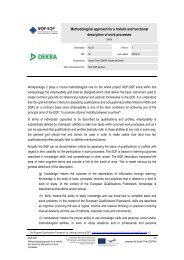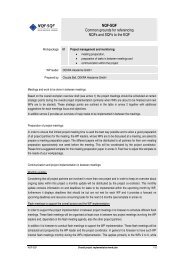Overview of National Qualification frameworks - Project-Nqf-Sqf
Overview of National Qualification frameworks - Project-Nqf-Sqf
Overview of National Qualification frameworks - Project-Nqf-Sqf
Create successful ePaper yourself
Turn your PDF publications into a flip-book with our unique Google optimized e-Paper software.
epresentatives <strong>of</strong> education and industry will make a formal assessment on the basis <strong>of</strong> Occupational Standards. The TradeTesting mechanism described above will be absorbed by the structure <strong>of</strong> the Sector Skills Council as there will be a single set<strong>of</strong> national occupational standards and one national Council per sector.__access to other forms <strong>of</strong> validation or transfer <strong>of</strong> learning in order to obtain a formal qualification (partial or full).An innovative feature <strong>of</strong> the School Leaving Certificate which was launched in October 2009 is that the transcript will not onlyshow a record <strong>of</strong> formal achievements, but it will also include a positive list <strong>of</strong> personal qualities, informal and non-formallearning. Thus at the end <strong>of</strong> compulsory education the learners will show the employer that the sixteen year old has achieved aholistic education. The School Leaving Certificate is referenced to a full MQF and EQF Level 1.All home-grown qualifications have an element <strong>of</strong> informal and non-formal learning as formal learning that takes place in classis complemented by hands-on learning. Home-grown qualifications can be either full or partial depending on the workloadtranslated into ECTS/ ECVET credits.In Spain the very recent national system for Assessment/Validation/Evaluation and Accreditation (Certification) wasestablished legally since July 2009 via Law Real Decree 1224/2009 .System Management is descentralized to each Region where regional competente bodies (Governemnt agencies linked toEducation and Labour Ministries) will undertake the task <strong>of</strong> structuring and implementing the system.It will benefit from this system Workers and Students who will be able to validate their knowledge acquired by any means(formal and non formal/ informal education). Globally the system comprehends 3 parts:1 – Previous Assessment2 – Evaluation <strong>of</strong> Competences3- Acreditation (Certification total or partial) & Registration <strong>of</strong> Pr<strong>of</strong>essional Compence and/or <strong>Qualification</strong>.Note: A <strong>Qualification</strong> is comprised by a series <strong>of</strong> Competence Unities. Each competences unite corresponds to 1 trainingmodule and to 1 certificate. Example:Welding <strong>Qualification</strong> comprises 4 Competences Unities1 Training Module finalized = 1 Competence unity acquired =1 Certificate obtained ( partial)4 Training Module finalized = 4 Competence unity acquired = Final Certificate obtained ( total)1 Certificate is a document issued by Ministry <strong>of</strong> Labour linked entities1 Title is a document issued by Ministry <strong>of</strong> Education linked entities1 Final Certificate obtained via Ministry <strong>of</strong> Labor entities = 1 Title obtained via Ministry <strong>of</strong> Education entitiesTable 2Nonformal and informal learning in SpainAssessmentEvaluationAcreditation ( Certification Partial orTotal)WHENWHATWHYPrevious to Competences EvaluationProcessCandidate Presents documental/verbalevidences <strong>of</strong> Competences in relation tothe <strong>Qualification</strong> and the CompetencesUnities he wants obtain <strong>of</strong>ficialrecognitionCandidate wants to obtain a formalrecognition <strong>of</strong> his knowledge ( certificateand/or title ( total or partial)) related tocertain qualification. System needs topre-assess its knowledge to provideorientation/guidance in relation to how toundertake the evaluation processIt takes place after Assessmentin Oficial Centers for thispurpose defined by RegionalBodiesPractical and theoreticalevaluation <strong>of</strong> Competenceunities related to certain<strong>Qualification</strong>Candidate needs todemonstrate he has theknowledge and skills describedat the <strong>National</strong> <strong>Qualification</strong>Catalogue in relation to acertain <strong>Qualification</strong>Evaluation PositiveCandidate Obtains OficialRecognition <strong>of</strong> hisKnowledges and SkillsAcreditation is necessary toissue <strong>of</strong>icial recognition ®istration that candidate isQualified in certain<strong>Qualification</strong> and to berecognized by Ministry <strong>of</strong>Labour and Ministry <strong>of</strong>Education linked entitiesthroughout the territory.EvaluationNegativeCanditadegoes back toAssessmentphaseNQF-SQF:"This project has been funded with support from36/37<strong>Overview</strong> <strong>of</strong> <strong>National</strong> <strong>Qualification</strong>prepared by 3s research laboratory<strong>frameworks</strong>the European Commission. This publicationreflects the views only <strong>of</strong> the author, and theCommission cannot be held responsible for anyuse which may be made <strong>of</strong> the informationcontained therein."




